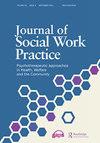Young people on the ‘edge of care’: perspectives regarding a residential family intervention programme using social pedagogic and systemic approaches- striving for ‘humane practice’
IF 1.4
4区 社会学
Q3 SOCIAL WORK
引用次数: 0
Abstract
ABSTRACT Support approaches and interventions to keep families together are major goals in family welfare services. Different service models are used including some targeted at families where the assessment is part of family court pre-proceedings. Although outcomes of family interventions have been extensively researched, there is limited recent research regarding the subjective experiences of young people, their parents/carers and professionals who experience an intervention where they all live together for a short period and where mutually agreed goals and a family programme are co-created. This article presents findings from an exploratory qualitative study into a residential family learning project where families from an English inner-city local authority and professionals reside together for up to a week with engagement in intensive family work. Findings revealed mixed experiences of the intervention with a key theme being that a sense of time and space allowed the families to reflect and listen to each other’s perspectives leading to relationships improving and shifting. However, despite positive changes being made during the intervention sustaining these changes when returning home was often challenging. Findings, which are linked to the systemic idea of punctuation where families saw professionals differently and vice versa, had particular significance for families experiencing social and economic deprivation.处于“护理边缘”的年轻人:关于使用社会教育和系统方法的寄宿家庭干预计划的观点-努力实现“人道实践”
维持家庭团聚的支持方法和干预措施是家庭福利服务的主要目标。我们采用了不同的服务模式,包括一些针对家庭的服务模式,其中评估是家事法庭诉讼前程序的一部分。虽然对家庭干预的结果进行了广泛的研究,但最近关于年轻人、他们的父母/照顾者和专业人员的主观经历的研究有限,这些人经历了短期共同生活的干预,共同制定了共同商定的目标和家庭方案。本文介绍了一项对寄宿家庭学习项目的探索性定性研究的结果,该项目由来自英国市中心地方当局的家庭和专业人员共同居住长达一周,并参与密集的家庭工作。调查结果揭示了干预的复杂体验,其中一个关键主题是时间和空间的感觉使家庭能够反思和倾听彼此的观点,从而改善和改变关系。然而,尽管在干预期间发生了积极的变化,但在返回家园时维持这些变化往往具有挑战性。研究结果与标点符号的系统观念有关,即家庭对专业人士的看法不同,反之亦然,这对经历社会和经济剥夺的家庭具有特别重要的意义。
本文章由计算机程序翻译,如有差异,请以英文原文为准。
求助全文
约1分钟内获得全文
求助全文
来源期刊

Journal of Social Work Practice
SOCIAL WORK-
CiteScore
2.50
自引率
7.10%
发文量
39
期刊介绍:
The Journal of Social Work Practice publishes high quality refereed articles devoted to the exploration and analysis of practice in social welfare and allied health professions from psychodynamic and systemic perspectives. This includes counselling, social care planning, education and training, research, institutional life, management and organisation or policy-making. Articles are also welcome that critically examine the psychodynamic tradition in the light of other theoretical orientations or explanatory systems. The Journal of Social Work Practice is committed to a policy of equal opportunities and actively strives to foster all forms of intercultural dialogue and debate.
 求助内容:
求助内容: 应助结果提醒方式:
应助结果提醒方式:


